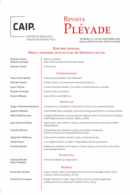El populismo como dimensión y lógica de la política: propuestas, alcances y límites de la teoría populista de Laclau

Publicado 2015-12-27
Palavras-chave
- Laclau,
- populismo,
- hegemonía,
- pueblo,
- demandas
Como Citar

Este trabalho está licenciado sob uma licença Creative Commons Attribution-NonCommercial 4.0 International License.
Resumo
El presente artículo tiene como objeto dar a conocer la propuesta teórica de Laclau en relación al populismo. Desligándose del modo tradicional en que ha sido estudiado el término, Laclau enfatiza el hecho que lo que distingue a una articulación populista es su naturaleza ontológica y no óntica, por lo que el populismo se definiría, esencialmente, como un “juego” discursivo (subsumido en lógicas diferenciales-equivalenciales) de tipo hegemónico entre el pueblo y el bloque de poder. Se ha dividido el trabajo en dos secciones, ambas teóricas: en la primera, se presenta en profundidad la teoría de Laclau y se reconstruyen las tesis centrales que hacen de su propuesta un renovado aporte a la “teoría populista”. La segunda sección, en tanto, tiene por objeto tensionar el modelo teórico propuesto por Laclau a partir de tres autores, a saber: Aboy Carlés, Barrios y Burdman. En efecto, aquí se sostiene que de no resolver teóricamente los límites de la propuesta de Laclau, específicamente lo que dice relación con establecer una mayor interrelación teórica entre forma y contenido, entre lógica populista y lógica institucional, es muy poco probable que estudios posteriores puedan establecer una conexión más profunda con la experiencia.